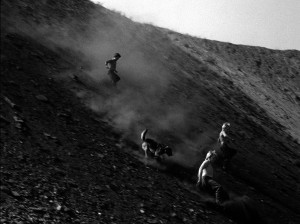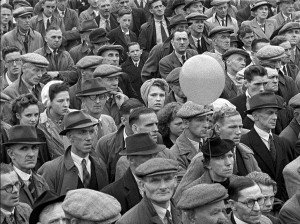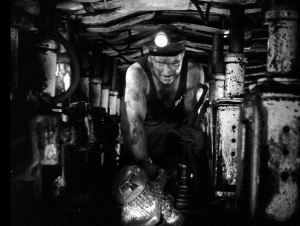Filmmaker Bill Morrison finds the beauty in the dedication of British coal miners

Typically the world of documentary film is enamored of the present. What’s happening on the streets? What’s happening overseas? What’s happening in the communities of the United States? They might be informed by the past, but these films are largely meant to define an issue or problem facing modern-day society.
Bill Morrison, the celebrated director of Decasia, cuts across the grain compared to his fellow filmmakers. Here’s an auteur focused on presenting our collective past not through the eyes of talking heads or statistical pie charts, but through the historical footage of an era.
In The Miners’ Hymns, which is currently playing at the Film Forum in New York City, Morrison turns his eye toward the coal-mining industry in northern England. Using footage from the British Film Institute National Archive and BBC, the filmmaker pulls together an entire 52-minute movie from scenes of workers shoveling coal in the mines and protesting for their union rights in the street. Sprinkled among the black-and-white images are modern-day shots of what the mines look like in the present day. It’s no surprise that the industry is gone, replaced by grocery stores and green hills. In some ways, the current scenes look like a marked improvement on the black-tinged, smoky environment of the past. But what’s missing are the jobs, the sense of self-importance, the banding together of workers, the very idea of disposable income.

The coal-mining industry has gained notoriety in recent years thanks to the work of Lee Hall, writer of Billy Elliot and The Pitmen Painters. Hall used the time period as a backdrop to tell stories of artistic expression. Morrison uses the time period not solely as a backdrop, but as the very subject itself. He dares us to look at the expressions of these people and the dedication of their actions. And we’re not meant to digest the images as some historical snapshot that’s chiseled into the concrete tablets of a bygone era. They serve as reminders of a forgotten age, a time period when workers had the power and courage to speak with one voice, when a man could earn self-respect by the hard-earned sweat that rolled down his forehead.
Helping Morrison’s thesis is the original score by Icelandic composer Jóhann Jóhannsson, which is perfectly paired with the edited footage. How amazing is it that the film features no dialogue, no contemporary scholars expounding about workers’ rights, no subtext or needless exposition — and yet, the footage is much more emotional and effective than one would expect. The final shots of these miners parading through the streets, hoisting their union banners for all to see, is a triumphal sequence that feels so odd to a 2012 audience.

I suppose that Morrison does touch upon present circumstances like his fellow documentarians. He may use historic found footage, but when edited together and combined with a rousing score, it’s meant to take on a new life. We are instigated to look closer and see the parallels to modern society. Maybe The Miners’ Hymns has more to say about 2012 than it even does about the early 20th century.
And for those disappointed by The Iron Lady, the new Margaret Thatcher biopic that skips over her controversial actions against the coal-mining industry, The Miners’ Hymns serves as a nice complement, a film unwilling to miss the point.
Note: If you see The Miners’ Hymns at the Film Forum in New York City, the movie is shown with several of Morrison’s short films, including Release about Al Capone, Outerborough about the Brooklyn Bridge and The Film of Her about the Library of Congress’s Paper Print Collection. All are nice additions, especially The Film of Her.
By John Soltes / Publisher / John@HollywoodSoapbox.com
-
The Miners’ Hymns
-
2011
-
Directed by Bill Morrison
-
Featuring music by Jóhann Jóhannsson
-
Running time: 52 minutes
-
Rating:





